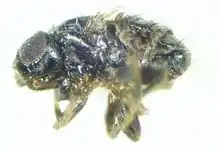| Carnidae | |
|---|---|
 | |
| Carnus hemapterus | |
| Scientific classification | |
| Domain: | Eukaryota |
| Kingdom: | Animalia |
| Phylum: | Arthropoda |
| Class: | Insecta |
| Order: | Diptera |
| Superfamily: | Carnoidea |
| Family: | Carnidae Newman, 1834[1] |
| Synonyms | |
Carnidae, also known as bird flies or filth flies, is a family of flies (Diptera). There are 6 genera, containing about 93 species worldwide.[4]
Description
Carnidae in general are small (1–2 mm) black flies.[4]
One feature of Carnidae is the frons of the head having some orbital setae medioclinate (pointing inwards) and others lateroclinate (pointing outwards). In Carnus,[5] Hemeromyia, Meoneura and Enigmocarnus, the anterior two pairs of setae are medioclinate and the posterior two pairs are lateroclinate.[4] In Neomeoneurites and the extinct genus Meoneurites, the anteriormost pair is medioclinate and the posterior three pairs are lateroclinate.[4]
Ecology
Most Carnidae are saprophagous. Adults have been found on dung, carrion, flowers of Apiaceae and other plants, in bird nests and sometimes in bird feathers. Larvae have been found in bird and mammal nests, damaged pupae of Sarcophaga sp. (Sarcophagidae), stems of Ferula sp. (Apiaceae), Leccinum fungus (Boletaceae), dung, salted fish and plant remains.[6]
Adults of Carnus such as C. hemapterus and C. orientalis are exceptions, feeding on blood of birds. They are associated with bird nests and nestlings.[5]
Genera
- Carnus Nitzsch, 1818[7][8]
- Enigmocarnus Buck, 2007[9]
- Hemeromyia Coquillett, 1902[10]
- Meoneura Rondani, 1856[11][8]
- †Meoneurites Hennig, 1965[12]
- Neomeoneurites Hennig, 1972[13]
External links
References
- ↑ Newman, E. (1834). "Attempted division of British insects into natural orders". The Entomological Magazine. 2: 379–431. Retrieved 10 November 2021.
- ↑ Frey, R. (1921). "Studien über der Bau des Mundes der niederen Diptera Schizophora nebst Bemerkungen über die Systematik dieser Dipteren-Gruppe". Acta Societatis Pro Fauna et Flora Fennica. Helsinki. 48 (3): 1–247. Retrieved 21 October 2017.
- ↑ Cogan, B.H. (1976). Other families [of Schizophora-Acalyptratae, not Agromyzidae, Chloropidae, Sciomyzidae, Sepsidae, or Sphaeroceridae.] Pp. 69-76, 80-87 & 94. In Kloet, G. S. & Hincks,W. D., A checklist of British insects (ed. 2) Part 5: Diptera & Siphonaptera. Handbooks for the Identification of British Insects. Vol. 11. Royal Entomological Society. pp. ix + 139.
- 1 2 3 4 Brake, I. (2011). "World Catalog of the Family Carnidae (Diptera, Schizophora)" (PDF). Myia. 12: 113–169.
- 1 2 Iwasa, Mitsuhiro; Sakamoto, Hironori; Asahi, Kento (2014-03-01). "Discovery of a Bird-Parasitic Fly, Carnus orientalis (Diptera: Carnidae), in Japan, With Bionomic Remarks and a Key to Carnus Species". Journal of Medical Entomology. 51 (2): 484–488. doi:10.1603/ME13087. ISSN 0022-2585. PMID 24724300.
- ↑ Ozerov, A. L.; Krivosheina, M. G. (2022). "To the fauna of Carnidae (Diptera) of Asia". Euroasian Entomological Journal (in Russian). 31 (1): 87–91. doi:10.15298/rusentj.31.1.18. ISSN 1684-4866.
- ↑ Nitzsch, C.L. (1818). "Die Familien und Gattungen der Thierinsekten (Insecta epizoica) als Prodromus einer Naturgeschichte derselben" (PDF). Mag. Ent. (Germar). 3: 261–316. Retrieved 19 January 2022.
- 1 2 Chandler, Peter J. (1998). Checklists of Insects of the British Isles (New Series) Part 1: Diptera. Handbooks for the Identification of British Insects. Vol. 12. London: Royal Entomological Society of London. pp. 1–234. ISBN 0-901546-82-8.
- ↑ Buck, M; Marshall, S. A. (2007). "Enigmocarnus chloropiformis gen. et sp. nov., and parallel evolution of protandrial symmetry in Carnidae (Diptera)" (PDF). Annals of the Entomological Society of America. Entomological Society of America. 100 (1): 9–18. doi:10.1603/0013-8746(2007)100[9:ecgesn]2.0.co;2. Retrieved 4 January 2013.
- ↑ Coquillett, D.W. (1902). "New acalyptrate Diptera from North America". Journal of the New York Entomological Society. 10: 177–191. Retrieved 9 February 2021.
- ↑ Rondani, Camillo (1856). Dipterologiae Italicae Prodromus. Vol: I. Genera italica ordinis Dipterorum ordinatim disposita et distincta et in familias et stirpes aggregata. Parmae [= Parma].: A. Stocchi. pp. 226 + [2]. Retrieved 17 October 2020.
- ↑ Hennig, W. (1965). "Die Acalyptratae des Baltischen Bernsteins und ihre Bedeutung fur die Erforschung der phylogenetischen Entwicklung dieser Dipteren-Gruppe". Stuttgarter Beiträge zur Naturkunde. 145: 1–215. Retrieved 20 January 2022.
- ↑ Hennig, W. (1972). "Beiträge zur Kenntnis der rezenten und fossilen Carnidae, mit besonderer Berucksichtigung einer neuen Gattung aus Chile" (PDF). Stuttgarter Beiträge zur Naturkunde. 240: 20. Retrieved 19 January 2022.